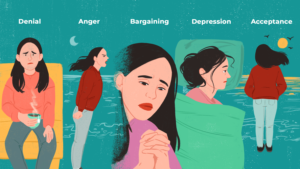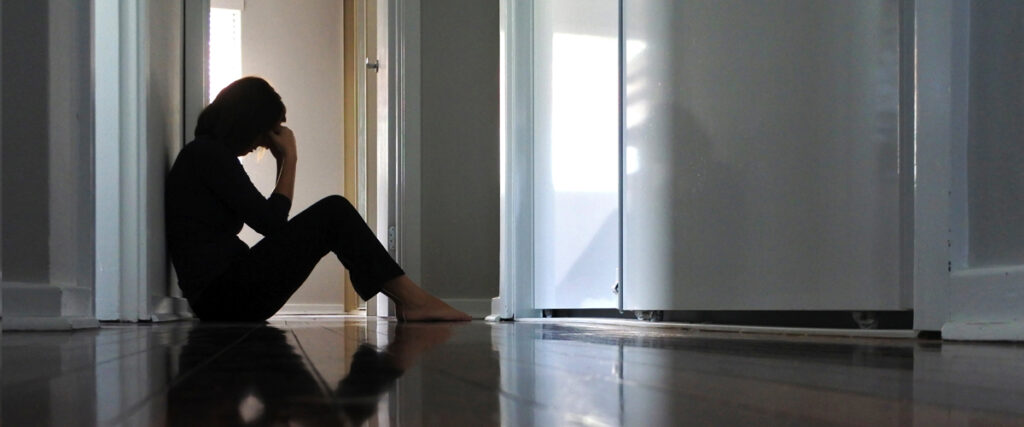Contents
What Is Grief?

Grief is a natural response to loss. It can be triggered by the death of a loved one, the end of a relationship, or any other type of loss. Grief can also occur when something good happens, such as the birth of a child or getting married. Grief is unique to each individual and there is no right or wrong way to experience it.
Everyone experiences grief in different ways. Some people feel the five stages of grief acutely, while others may only experience a few of them. The seven types of grief are also unique to each individual. There is no one way to cope with grief, but there are some strategies that can help. In this blog post, we will explore what grief is, the five stages of grief, the seven types of grief, and how to cope with them. We will also discuss the benefits of grieving and when to see a doctor if you are experiencing symptoms of grief.
Five Stages of Grief

There are five stages of grief: denial, anger, bargaining, depression, and acceptance. Not everyone experiences all five stages in the same order. Some people may skip a stage or cycle back and forth between them.
Denial
Denial is when you refuse to accept that the loss has occurred. You may feel like it’s all a dream and that you will wake up soon. You may also try to ignore the pain or push it away.
Anger
Anger is often the first reaction to grief. You may feel angry at the person who died, at God, or at yourself. You may feel like you can’t forgive anyone.
Bargaining
Bargaining is when you try to make a deal with God or the universe in an attempt to undo the loss. You may offer to do anything in exchange for bringing back your loved one.
Depression
Depression is common after a loss. You may feel like you can’t go on without your loved one. You may feel sad all the time, have trouble sleeping, or lose interest in things you used to enjoy.
Acceptance
Acceptance is when you come to terms with the loss. You may still feel sad at times, but you are able to live with the pain. You may find new meaning in life now that your loved one is gone.
Symptoms Of Grief
Grief can affect your physical, emotional, and mental health. Some common symptoms of grief are:
 Physical
Physical
- Fatigue
- Aches and pains
- Insomnia or hypersomnia
- Changes in appetite
Emotional
- Anger
- Sadness
- Anger
- Anxiety
- Depression
Mental
- Cognitive impairment, such as trouble focusing or remembering things
- Lack of interest in activities you used to enjoy
- Suicidal thoughts or behaviors
- Confusion
- Lack of concentration
- Memory problems
Other Symptoms-
- Mourners often feel guilt over things they said or did before the death
- People can feel a sense of abandonment after a loved one dies
- There is often a feeling of betrayal when someone close to you dies
- Many people experience anger after a death. Some common symptoms of grief are fatigue, mood swings, changes in eating habits, and trouble sleeping.
Seek out support from friends, family members, professionals, or support groups as you work through your grieving process. If you are experiencing any of the above symptoms, it is important to see a doctor
Benefits of Grieving
 Grief can be a difficult process, but it also has its benefits. Some of the benefits of grieving are:
Grief can be a difficult process, but it also has its benefits. Some of the benefits of grieving are:
- Allows you to express your feelings and emotions.
- Helps you come to terms with the loss.
- Allows you to rebuild your life after the loss.
- Can make you stronger and more resilient.
- Help you connect with others who have gone through a similar experience.
- Can lead to a greater understanding of yourself and your loved ones.
- Accept the loss
- Move on from the loss
- Find new meaning in life
- Connect with other people who have experienced a similar loss
Seven Types of Grief

There are seven types of grief: anticipatory, intellectual, emotional, physical, social, spiritual, and cultural. Not everyone experiences all seven types.
Anticipatory Grief
Anticipatory grief is when you experience grief before the loss actually occurs. You may feel sad or anxious about the loss. You may also have trouble sleeping or eat less than usual.
Intellectual Grief
Intellectual grief is when you experience grief after learning of a loved one’s death. You may feel like you can’t believe it happened or that you are in denial. You may also have a lot of questions about what happened.
Emotional Grief
Emotional grief is when you experience the most pain after a loss. You may feel like you are in mourning and have trouble functioning day-to-day. You may also have physical symptoms such as headaches or nausea.
Physical Grief
Physical grief is when you experience physical symptoms after a loss. You may have trouble sleeping, eat less than usual, or feel exhausted all the time.
Social Grief
Social grief is when you lose your support system after a loss. You may feel like you can’t talk to anyone about what happened or that no one understands what you’re going through.
Spiritual Grief
Spiritual grief is when you lose your connection to a higher power after a loss. You may feel like you have lost your purpose in life or that there is no point in going on.
Cultural Grief
Cultural grief is when you experience grief after the loss of your culture or way of life. You may feel like you can’t identify with anyone anymore or that your culture is no longer important to you.
Reasons Of Grief
There are many reasons why people may experience grief. Some of the most common reasons are:
- Death of a loved one: Is the most common reason for grief. The death of a loved one can leave you feeling sad, angry, confused, and many other emotions.
- Ending a relationship: Losing a partner can be difficult and cause feelings of grief.
- Loss of a pet: Pets are often considered members of the family and their loss can be devastating.
- Losing a job: Losing your job can cause feelings of grief, especially if you loved your job or were very attached to it.
- Moving: Moving to a new house or city can be difficult and cause you to grieve the loss of your old home.
- Retirement: Retirement can be a time of great change and can cause you to grieve the loss of your old life.
- Illness: Having a serious illness can cause you to grieve the loss of your health.
- Parent’s divorce: If your parents get divorced, you may grieve the loss of the family you once had.
Grief can be triggered by any type of loss. It is a natural response to change and can be a normal part of life.
How Grief Can Affect Your Health?

Grief can affect your physical, emotional, and mental health. Some common symptoms of grief are:
- Fatigue: Grief can be very exhausting, both emotionally and physically.
- Aches and Pains: Grief can cause physical pain, such as headaches, stomachaches, or back pain.
- Insomnia or Hypersomnia: Grief can cause difficulty sleeping or too much sleep.
- Changes in Appetite: Grief can cause a loss of appetite or an increase in appetite.
- Anger: Anger is a common emotion during grief. You may feel angry at the person who died, at God, or at yourself.
- Sadness: Sadness is also common during grief. You may feel like you will never be happy again.
- Anxiety: Anxiety is another common feeling during grief. You may worry about things you never worried about before.
- Depression: Depression is a very common reaction to grief. You may feel like you can’t go on without the person who died.
How To Stop Grieving?
 There is no one right way to stop grieving. Some people may find relief through writing, talking with friends or a therapist, or participating in support groups. Others may find that they need more time to heal. It is important to do what feels best for you and allows you to cope with the loss.
There is no one right way to stop grieving. Some people may find relief through writing, talking with friends or a therapist, or participating in support groups. Others may find that they need more time to heal. It is important to do what feels best for you and allows you to cope with the loss.
Writing- Putting your feelings down on paper can be a helpful way to process them.
Reading– Reading about other people’s experiences with grief can help you feel not so alone.
Talking– Talking to friends and family members can be a great way to express your feelings and get support.
Therapy– If you are struggling to cope with the loss, talking to a therapist may be helpful.
Talking with friends or family– Talking about the loss can help you feel more connected to others and may make the grief process easier.
Talking with a therapist– If you are finding it difficult to cope with the loss, talking with a therapist may be helpful. They can provide support and guidance.
Participating in support groups– There are often groups available for people who have experienced a similar loss. These groups can offer comfort and support. Joining a support group for grieving can provide valuable support from others who are going through the same thing.
Tips for coping with grief

There is no one right way to stop grieving. Some people find comfort in talking about the person who died, while others prefer to keep their feelings bottled up. The following tips may help you cope with your grief:
- Talk to someone about what you’re going through, whether it’s a friend, family member, therapist, or support group.
- Write down your thoughts and feelings in a journal.
- Create or join a support group for people who are grieving.
- Find an activity that brings you joy and try to do it every day.
- Remember the good times you shared with the person who died and tell your friends and family about them.
- Allow yourself to feel the emotions. Don’t try to bottle them up or ignore them.
- Talk about your loved one with friends and family.
- Find an activity that allows you to express your feelings, such as writing, painting, or singing.
- Spend time outdoors in nature.
- Reach out for professional help if the pain is too much to handle on your own.
- Allow yourself to heal at your own pace. Don’t compare your healing process to others.
- Seek support from others who have gone through a similar experience.
- Take care of yourself both physically and emotionally.
Grief can be a difficult process, but it is important to remember that you are not alone. There are people who can help you through your grieving process. Seek out support from friends, family, professionals, or a support group.
Therapy For Grief

Grief can be a difficult process to go through. If you are finding it hard to cope, talking to a therapist may be helpful. They can provide support and guidance as you work through your grief. There are also groups available for people who have experienced a similar loss. These groups can offer comfort and support.
Types of Therapy For Grief
There are many different types of therapy for grief. Some of the most common therapies include:
- Psychotherapy: This type of therapy focuses on the emotions that are associated with grief.
- Cognitive Behavioral Therapy: This type of therapy helps you to change the way you think about the loss and how it affects your life.
- Interpersonal Psychotherapy: This type of therapy helps you to deal with relationships that have been affected by the death.
- Grief Counseling: This type of counseling is specific to helping people cope with their grief.
- Creative Arts Therapies: These therapies use creative expression, such as art, music, or writing, to help process emotions related to grief.
- Spiritual guidance: This type of therapy helps you to connect with your spiritual beliefs and find comfort in them.
- Group Therapy: This type of therapy involves meeting with a group of people who are also grieving the loss of someone close to them.
All of these therapies can be helpful in dealing with grief. It is important to find what works best for you and allows you to cope with your loss. Grief is a process that takes time, but you can get through it. Reach out for help if you need it. You are not alone.
Remember, you are not alone in your grieving process. There are people who can help you get through it. Reach out for support from friends, family, professionals, or a support group. Take care of yourself both physically and emotionally as you work through your grief. Grieving takes time, but you will heal in time.
When to See a Doctor?
If you are experiencing any of the following symptoms, it is important to see a doctor:

- Excessive crying
- Trouble eating or sleeping
- Feeling overwhelmed or out of control
- Thoughts of suicide or self-harm
- Unusual mood swings
- Thoughts of suicide or self-harm
- Excessive alcohol or drug use
- Trouble eating or sleeping
- Intense feelings of guilt or worthlessness
- Prolonged sadness or emptiness
- Inability to enjoy activities that were once pleasurable
- Persistent feeling of anxiety or panic
If you are having trouble coping with your grief, do not hesitate to reach out for help. There are people who can assist you in finding the resources you need to heal. Grief is a process that takes time, but you can get through it. Crisis counselors are available 24/hours a day, seven days a week. They will talk with you about your situation and connect you with local resources.
Conclusion
Grief is a natural response to loss. It can be difficult to cope with, but there are many benefits to grieving. There are seven types of grief and each person experiences them differently. It can affect your physical, emotional, and mental health. If you are experiencing any unusual symptoms after a loss, it is important to see a doctor. Coping with it takes time and there is no right or wrong way to do it. There are many resources available to help you through the process.
A Word From Therapy Mantra
Your mental health — Your psychological, emotional, and social well-being — has an impact on every aspect of your life. Positive mental health essentially allows you to effectively deal with life’s everyday challenges.
At TherapyMantra, we have a team of therapists who provide affordable online therapy to assist you with issues such as depression, anxiety, stress, workplace Issues, addiction, relationship, OCD, LGBTQ, and PTSD. You can book a free therapy or download our free Android or iOS app.

 Physical
Physical
